After waking up on Saturday 9 October, just look at the programme Grimmfest attendees had in store! What a day…
Seagull (Peter Blach, UK)
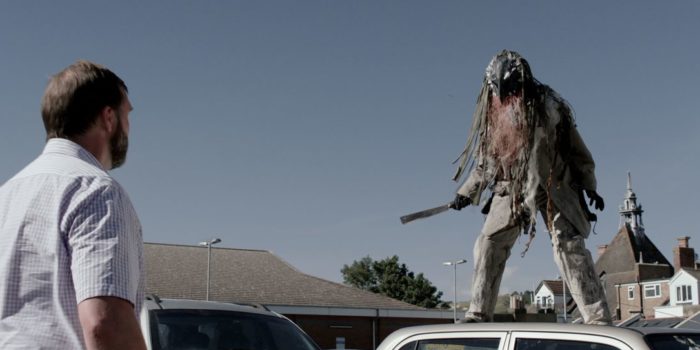
When Rose (Gabrielle Sheppard) can no longer stay in her idyllic beach shack, she heads home to confront her past. Those she left behind eight years ago had been pretending she didn’t exist. Now Janet (Jessica Hynes) and Jeff (Adam Radcliffe), grandparents to little Lily, will have to face Rose and face her shadow, in the form of a human bird. This is one horrible family, and I felt very sorry for poor Lily, caught in the middle of old resentments. What’s interesting about the film is the stark contrast between the unhappy, grey home and the bright, contentedly wild coast. I know where I’d rather be.
Unfortunately, the tone of the film was too miserable to be interesting beyond that contrast. The few brief and rapid flashbacks are too brief and rapid to have a positive impact on the pace of the film. The story certainly had potential, and I think with a more experienced writer (and better calibre cast), it could have been gripping. It just wasn’t, though.
The Spore (D.M. Cunningham, USA)
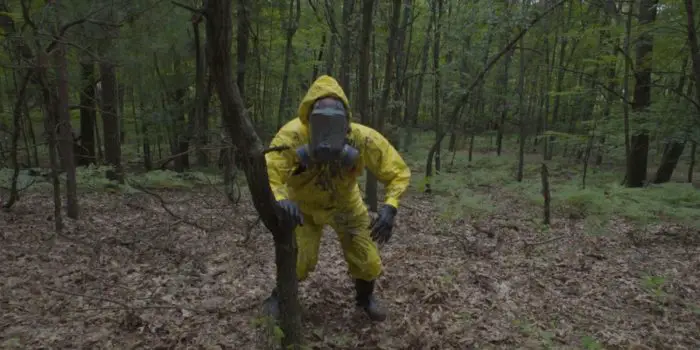
The Spore blew my mind. It’s one of those films that seems fairly humble at first but brings in shocks and surprises at every other turn. Once the special effects are brought in, it’s stunning; consequently, it wasn’t a surprise to discover that writer-director D.M. Cunningham started his career in creature effects on Starship Troopers.
The Spore is about an infestation, not of a zombie virus or anything of that sort, but something much more insidious: a fungus (or something similar) that spreads invisibly across the land, infecting anyone who touches or ingests it. The film covers just a few days of this crisis, well established by now, and just one small rural area too (like A Quiet Place in both respects). The audience is given glimpses of the situation elsewhere, but only via radio news reports, harking back to Night of the Living Dead. Interestingly, we don’t follow one individual or family in these few days: it’s more like we are following the spread of the organism. As a result, the characters—such as they are—are not given much depth, but this makes sense. Reminding me of Romero’s The Crazies, this is an observation of events that could take place anywhere, among any people. If you have any interest in body horror or eco-horror, you’ll get your fill of both in this one simple film.
Alone With You (Emily Bennett and Justin Brooks, USA)

When a relationship is in decline, you don’t notice until it’s too late, and then you wonder if you were in denial all that time, unaware, or whether maybe it was actually sudden. This film caught me out like that. At first, it felt like a domestic drama in which Charlie (Emily Bennett) was a little too clingy and Simone (Emma Myles) a little too distant. Then just as we think we’re getting to know the situation, it steadily becomes apparent that nothing is as simple as it first appeared. Alone With You is focused almost exclusively on Charlie and set in one location (apart from brief flashes), thus reflecting the sense of isolation Charlie is struggling to deal with. Charlie is waiting for Simone to come home from a business trip, but it’s so hard when friends don’t sympathise and there are odd noises in the flat. Her mother (the ubiquitous Barbara Crampton) just makes things worse.
This is not the sort of horror film that relies on jump scares or violence but instead on the creeping panic so deftly portrayed by Bennett. It’s a puzzle as to whether we are watching Charlie’s frame of mind in decline or the relationship (and a good deal of the film is certainly open to interpretation), but then I remember just how much one decline can bring on another. I wasn’t happy with the very simplistic glimpse of bisexual representation in Alone With You, but apart from that, the film is both gripping and astutely written.
The Pizzagate Massacre (John Valley, USA)
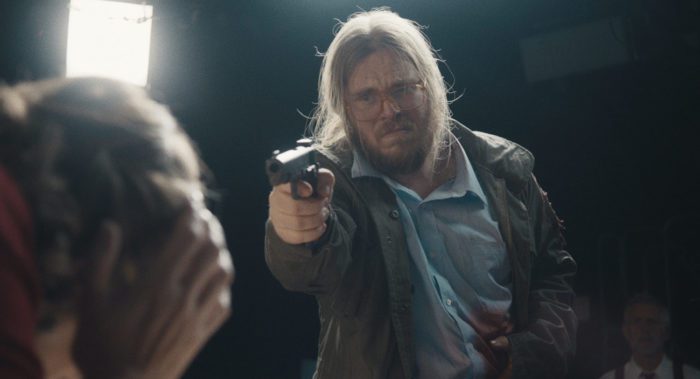
Sometimes the news is pretty weird, but there are those who believe it even when it’s at its weirdest, and there are others who take advantage. John Valley’s film is a dramatic (more than comedic) satire about such issues and about how sometimes it’s impossible to know what to believe or who to sympathise with. The Pizzagate Massacre is not a dramatization of the Pizzagate scandal but rather was inspired by it. The film centers on Duncan (Tinus Seaux), a sincere but muddled militia member, and Karen (Alexandria Payne), a fledgling reporter. Together, they set out to uncover the “truth” about the child sex trade run by reptile people from a pizza parlour basement because no one with any authority seems to be taking it seriously.
Those two characters really make the film, especially Duncan himself. He is not gung-ho but genuinely believes in the causes that his group represents, at least until he starts to think about them. He himself is believable because he is not extreme in any way, at least not in comparison to one or two others in his group. Duncan’s character is written to make you think: if you watch The Pizzagate Massacre and later hear about someone threatening gunfire on a shop or restaurant, you might not jump to the conclusion that this person is a terrorist. Perhaps they were caught up in something that got out of control. Thought-provoking as the film is, I don’t mean to suggest it is serious. It’s very entertaining and full of surprises, full of situations, in fact, that appear ludicrous at first, and then when you realise, “Yeah, this could happen,” you stop laughing.
The Deep House (Alexandre Bustillo and Julien Maury, France)
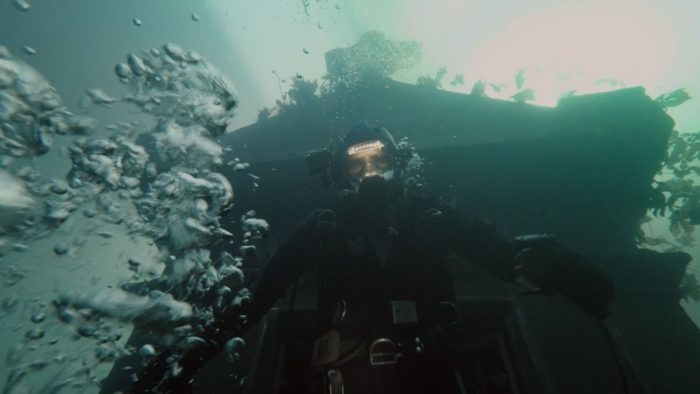
When visiting an unfamiliar place and an old local tells you the spot you really want is somewhere else, away from the tourists…do you trust him? If you’re the naïve lead characters in a horror film, of course you do, and then spend the rest of the film regretting it. The Deep House is about two underwater explorers (Camille Rowe and James Jagger) who go in search of a sunken house laden with cameras yet completely unprepared for what they might find.
You’re probably familiar with the directors’ names, but as Maury told me a couple of months ago, only their first film should be considered “extreme”; they want to make all kinds of horror films. In The Deep House, a great deal of effort has gone into the underwater cinematography and the meticulous sets inside the house of the title. It’s fascinating to watch before the horror starts as well as once it kicks in. From that point, claustrophobic and tense take over from captivating, and of course, there is also the pressure for the pair to get back to the surface before their air supply runs out. I must say, it fell down a little in the last act, though. It became kind of hasty, with a few narrative leaps instead of proper explanations, so in my opinion, it could have really done with being longer. That said, The Deep House is lots of gruesome fun…and do stick around for the brief post-credits scene.
Las noches son de los monstruos AKA The Nights Belong to Monsters (Sebastián Perillo, Argentina)
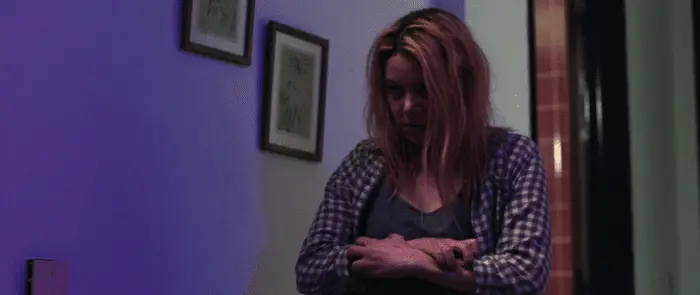
Sol (Luciana Grasso) and her mother go to move in with her mother’s boyfriend, who (perhaps tellingly) Sol hasn’t met until now. It involves starting a new school too, which (I remember all too well) isn’t easy as a teenager. It’s much easier to hang out on her own or make friends with those she shouldn’t than actually fit in with the cliques that have already formed. Somehow, Sol also makes friends with a large white dog, and the two look out for each other and become strangely bonded.
I’ve seen The Nights Belong to Monsters likened to Tigers are Not Afraid because of its blend of urban fantasy and (possibly supernatural) creatures who protect kids, but to me, it called to mind Better Days, the Chinese film about a teen girl dealing with bullies. In that, two characters connected despite normally having nothing to do with each other’s worlds, and the same happened here. It’s somewhat a fairy tale in that there is minimal background and the simplest of plots with some “just like that” moments. It works though, largely due to the character of Sol: she (like Sarah in Come True) is subtly and sensitively portrayed so that we can understand the strain she is feeling, even though she doesn’t say much. I especially admire the writing that presents the relationship with her mother’s partner as unhealthy without him being explicitly violent or abusive. Anyway, when in doubt, make friends with an animal.
Happy Times (Michael Mayer, United States/Israel)

Last year, Grimmfest treated us to An Ideal Host, the story of a dinner party that goes wrong due to squirmy aliens. This time, we have a film about a dinner party that goes wrong due to well, the guests. Happy Times has introduced me to the Israeli-American community of Hollywood, though I’m not sure this is the introduction they would have wanted! To some extent, the issues and conflicts that emerge—some right from the start and some gradually—are the same as might occur in any family or culture, but some are very specific, and the whole ensemble of characters, with their feelings about expectations, heritage, and religion, paints a very rich microcosm of Israeli life transplanted to modern California.
I confess I took a little while to feel at home in this very talky and well-to-do crowd, so I was grateful that plenty of time was given to introducing the characters and setting the scene. By the time the disagreements came to the surface—initially started by Michael (Michael Aloni) who considers that the sacred texts perpetuate racism—the various motivations were clear. Three of the cast especially stood out for me: Ido Mor as Yossi, man of the house and capitalist; Liraz Chamami who played his wife, Sigal, aiming to be the perfect hostess, no matter what; and Stéfi Celma as Aliyah, Michael’s girlfriend who has no hope at all of fitting in.
I’ve seen Happy Times described as a black comedy, and much of the violence that the discord descends into could have been farcical, except there wasn’t a great deal of humour. Nonetheless, I did find it very entertaining, with insult-laden dialogue and plenty of creative violence and tension. And the moral of the story? Do not assume you will all get along just because you have one major trait in common.
Also…
As well as all the above, Grimmfest also screened
- When The Screaming Starts (Conor Buro, UK), which Jerry J Sampson reviewed when it screened at FrightFest
- Motherly (Craig David Wallace, Canada), which Sean Parker reviewed when it screened at FrightFest.


